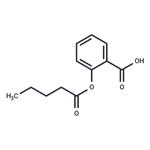Chemical Properties
clear colorless to light yellow liquid
Uses
Valeryl chloride is an intermediate for pharmaceuticals, agrochemicals, surfactants, fragrances, electronic chemicals.
General Description
A colorless fuming liquid with a pungent odor. Flash point 74°F. Fumes irritate the eyes and mucous membranes. Corrosive.
Air & Water Reactions
Highly flammable. Fumes in air. Reacts exothermically with water to generate hydrochloric and valeric acids, which are corrosive.
Reactivity Profile
Valeryl chloride is acidic. Incompatible with water, with bases, including amines, and with strong oxidizing agents and alcohols. May react vigorously or explosively if mixed with diisopropyl ether or other ethers in the presence of trace amounts of metal salts [J. Haz. Mat., 1981, 4, 291].
Health Hazard
May cause toxic effects if inhaled or ingested/swallowed. Contact with substance may cause severe burns to skin and eyes. Fire will produce irritating, corrosive and/or toxic gases. Vapors may cause dizziness or suffocation. Runoff from fire control or dilution water may cause pollution.
Fire Hazard
Flammable/combustible material. May be ignited by heat, sparks or flames. Vapors may form explosive mixtures with air. Vapors may travel to source of ignition and flash back. Most vapors are heavier than air. They will spread along ground and collect in low or confined areas (sewers, basements, tanks). Vapor explosion hazard indoors, outdoors or in sewers. Runoff to sewer may create fire or explosion hazard. Containers may explode when heated. Many liquids are lighter than water.
Flammability and Explosibility
Flammable
Safety Profile
A corrosive irritant to
skin, eyes, and mucous membranes. When heated to decomposition it emits toxic
fumes of Cl-.






